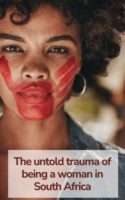A week ago, I drove to the Post Office near my home in Bryanston. I had been intending to renew my vehicle licence as I have been doing every year since I bought my car. But this time, as a I parked outside the building, I was overcome with anxiety and paralysing fear. So overwhelming was this feeling of terror that I ended up driving back home and deciding to utilise my Tiger Wheel and Tyre phone app to place an order for the disc. It was not the first time that I had had this crippling anxiety.
Not too long ago, I placed an order for groceries on the Checkers Sixty60 app. When it was brought to the house by the delivery guy, the package would not get through the locked burglar door. As he stood there waiting for me to open the door, I froze. I was immediately overcome by fear and ended up asking him to just leave the groceries on the stoep. I waited until the sounds of his delivery motorcycle had faded before opening the door to pick up the groceries.
It might sound exaggerated that someone would have a panic attack outside a Post Office or when food is being delivered at their door, but the reality is that these seemingly simple actions are terrifying for women in South Africa. For some people, the Post Office is just a building they go into to send and receive mail, renew vehicle licences, collect social grants or make and scan photocopies. But for me and millions of other women, the Post Office is where Uyinene Mrwetyana was brutally raped and murdered. And when we think of Mr Delivery, we cannot help but remember the plight of the 26-year-old Cape Town who was sexually assaulted by a driver who was delivery her food.
A few years ago, my friend Naledi and I developed a strategy for collecting food delivered by Uber Eats and Mr Delivery. When the delivery man arrived at my complex, I would immediately call Naledi and she would stay with me on the phone while my food was being delivered. I made sure to have the phone on speaker so that the delivery man would know that there was someone on the other end of the line who knew exactly what was happening. Naledi would do the same whenever she travelled using an Uber or Bolt. She would send me her live location and every few minutes, I would call to check if she was okay. She too would have her phone on speaker so that her driver would know that someone was aware of every move that the car was making. This was how we protected ourselves and each other.
Many women, particularly those like me who live alone, can tell you about the many different strategies that we employ to ensure our safety. There are usual strategies such as having CCTV cameras and alarm systems in our homes and panic assistance on our cell phones. I have two different panic assistance applications on my phone – one with OUTSurance and another with my home armed security company. I have developed a strategy for placing my phone in a pocket or purse that ensures that my finger automatically presses the panic button when I reach for the phone. While I do not drink or party, I know that my sister and her friends also have strategies for protection when they are out. They even have codes that they use to communicate, and always create a kind of convoy when one of them wants to go too the bathroom.
This is what it means to be a woman living in South Africa. We are afraid in our own homes, on the streets, in our offices, in shopping malls, in churches – absolutely everywhere. There is no corner in our country where we feel unconditionally safe and protected. And so, we battle with anxiety and have to medicate ourselves to function. We come up with strategies to survive. And for the fortunate few, even as it batters our pockets, we spend money on home and personal security. The tragedy in all this is that despite all of this, we never feel safe enough. We are acutely aware of just how vulnerable we are even when we are in security estates and crowded spaces. We have learnt that no place is too sacred or too crowded to guarantee our safety. We have learnt that no time of day is safe enough. Uyinene was raped and killed in broad daylight. Hillary Gardee was kidnapped outside a supermarket. Two women were raped inside a church in Mpumalanga just a few weeks ago.
I hope men who are reading this will understand what gender-based violence is doing to us. I hope they will internalise the depths of trauma that we go through as women in South Africa.
*Malaika is a Geographer and the bestselling author of Memoirs of a Born Free: Reflections on the Rainbow Nation and Corridors of Death: The Struggle to Exist in Historically White Institutions.



